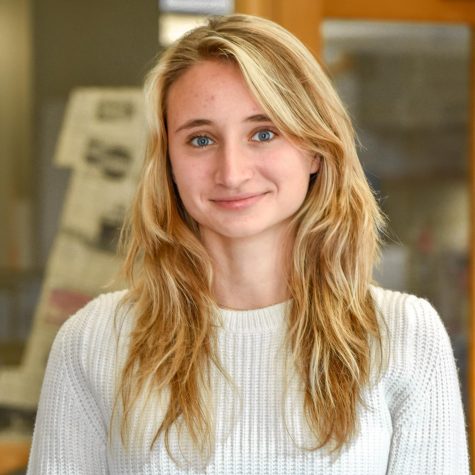Last week, the Tri Delta sorority announced on their Instagram page that they were relinquishing their chapter at Lafayette.
The decision comes after a summer in which social media accounts highlighted racism and sexual assault on campus, along with the beginning of an “abolish Greek life” movement. The sorority was also facing pressure from their National organization to recruit a substantial number of new members this fall, while still paying several hundreds of dollars in dues without clarity on how the money would be spent.
Sandi Manfreda ’21, former president of Tri Delta and the Panhellenic Council, explained that the decision to relinquish their chapter began this summer and was prompted by the new Instagram accounts, but that was not the sole factor behind the verdict.
“It started a couple of weeks ago, and it started with chapter conversations internally,” Manfreda said. “We had probably about three meetings where we got more of a consensus and wanted to go for the next steps, which was a conversation with Nationals.”
Manfreda explained that the executive board of the sorority met with Nationals, but their response to the chapters’ concerns was that what the executive board was voicing was not felt by the entire chapter.
“They [said] we need a whole chapter meeting to talk to everyone because the five of you just don’t know what’s going on,” Manfreda said. “Then we had a whole chapter meeting with the executive office…we all talked about our feelings and where we thought the chapter could go, and [Nationals] was like, ‘Oh, we’ll get back to you with lower dues, because that seems to be a big issue.’”
About a week later, the sorority attended a presentation by Nationals in which they lowered their total dues for the semester by 40 dollars, down to a total of 320 dollars. Additionally, they said that the chapter needed to recruit 50 members this year, an enormous amount for any Greek organization, or they were going to shut down the chapter, Manfreda said.
As a result of this meeting, Tri Delta decided to take a vote to relinquish their chapter which passed with a two-thirds majority, according to Manfreda.
“After that stuff, I had to write a letter officially requesting to relinquish the charter to the executive office. So, I wrote the letter expressing all the reasons,” Manfreda said. “But then we ran into a problem because in the letter I mentioned the abolish Greek life movement as one of the reasons for relinquishing the charter and Nationals was unhappy with that.”
Manfreda explained that her letter was then sent to the entire chapter and they were then required to hold a second vote and have not heard anything from the executive offices since it passed for the second time.
“They’re facing difficulty because they don’t want to approve us relinquishing our charter if we mentioned abolish Greek life because that would essentially mean for them that they’re admitting to the cause and allowing us to resign partially because of that, even though like I said, there are like other issues,” Manfreda said. “Now we’re just waiting and we’re in this weird limbo of being in suspension status but not officially out.”
The abolish Greek life movement at Lafayette is anonymously run and are spreading awareness mostly through their Instagram account, @abolishgreeklifeatlaf, and are calling to eliminate Greek life on campus. The account includes a variety of infographics and testimonials of students, alumni, and faculty who support abolition. They currently have about 200 signatures in an online petition that will be sent to faculty, administrators, and the Board of Trustees in a proposal to abolish Greek life.
“We stand in solidarity with the brave individuals who have shared their stories on the @black.at.laf and @anti.violence.laf Instagram pages,” the petition states. “After reflecting on these narratives, it is apparent that Greek Life is the root of many instances of discrimination, racism, sexual assault/harassment, and excessive drinking on campus.”
The founders of the @abolishgreeklifeatlaf account declined to be interviewed for this story.
There are a few main reasons that Tri Delta decided to relinquish their chapter, the first being dues. This is not just the overall cost each semester, but the lack of transparency in where the money they pay the national organization is being allotted.
“We never really get full answers about what parts of the budget [are] for what purpose,” Manfreda said. “For example, there’s a capital improvement fee for the Tri Delta house that we have on campus. And they said part of the money that we paid to Nationals is for cleaning of the house and cleaning supplies and cleaning people, but Nationals doesn’t clean the house. That is through Lafayette because Lafayette technically owns the house.”
The second reason they decided to relinquish their chapter was the campus climate surrounding Greek life at Lafayette especially after the anonymous reports of racism and sexual violence on the @black.at.laf and @anti.violence.laf Instagram pages.
“You don’t know how bad it is until you’re in it,” Manfreda said. “With the anti-violence Laf and Black at Laf Instagram accounts, it was continuously exposing all the issues within the current system and we knew about some from our place on campus, but truly we just don’t want to be in this system at Lafayette.”
Vanessa Pearson, the director of student involvement and interim Greek life advisor, explained what it takes for a chapter to relinquish their standing at Lafayette.
“Tri Delta’s decision to withdraw their chapter was an independent decision,” Pearson wrote in an email. “The chapters are private organizations and if students feel their own values are not in agreement with those organizations than they can choose to relinquish their own membership or, as a group, elect to work with their National offices to either make a change or disband.”
Pearson said that she is working closely with Student Government to develop and send out a survey to the entire student body addressing thoughts and concerns regarding Greek life.
“Based on their findings, then more conversations will occur with students, the Faculty Committee on Student Life, alumni, trustees, etc., on the future of Greek life,” Pearson added.
Pearson explained that as sororities and fraternities are independent organizations, individual chapters can elect to disband under their own parameters.
“The College extends recognition to fraternity and sorority chapters but as the organizations are private, they may elect to disband under their guidelines,” Pearson wrote. “In those cases, when the College receives official notice from the National Headquarters that the organization does not have a chapter, we will update our materials for students.”
As of now, there is no official statement of what will happen to the Tri Delta house. The house belonged to the fraternity Delta Tau Delta before Tri Delta moved on campus, but the house may not return to them. Pearson said that the Tri Delta house is owned by Lafayette and its future use will be based on the occupancy needs of the college.
“Personally, there are other organizations outside of Greek life that that house could be used to create a great community for, like APO, the service fraternity, or NIA, or other clubs or organizations that are outside of Greek life that could also use a community space,” Manfreda said.



























































































































